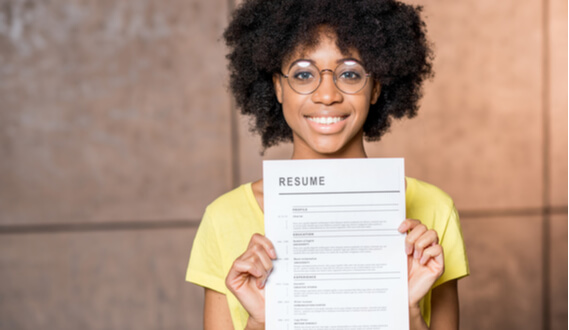As soon as it’s time to change jobs, many people think about what to do with their resumes. Many of them decide to simply edit their resume for new vacancies, but some still undertake to rewrite them from scratch. In both cases, people are concerned about the question “how much work history to put on a resume?” In order to make it easier for yourself, you can use the professional resume service. Here you can find specialists who can both edit and create a new resume. In addition, you can also order a CV, cover letter, and other documents for your job search.

How Far Back Should a Resume Go
If you still want to create your resume yourself, we have a few tips for you. In general, many resume specialists don’t recommend adding work experience that you received more than 15 years ago. However, every single situation requires personal attention. In this article, we’ll look at a few different options that will work just for you.
How Many Years of Experience Should Be On a Resume?
All the potential employees certainly want to show their best and add enough jobs, but do not forget about the optimal length of the resume. The best length for a resume is one, or two pages. Recruiters or potential employers most likely won’t even look at your 5-page document with all the years of experience. So, let’s figure out how many years of experience on resume should you indicate?
Two years and less
This option is suitable for those who have recently graduated from a university or school. In this case, many people have little experience. However, do not worry about this.
Make sure you include enough information in your resume about the different projects you have participated in. This can be volunteering, unpaid work, internships, or freelancing. Also, indicate your personal qualities and your activities at the university or school.
Employers are well aware that you have not yet had the opportunity to gain much work experience. Just do your best to match your resume to the job you want to get.
Read More: How to Make a Resume With No Experience
Two to five years
If you have been working for more than two years, this means that your resume will already be more varied. Therefore, you can no longer rely on information about the school and university. Such information can be safely deleted. Instead, you can add more work positions and bullets describing responsibilities and achievements.
Here you can also pay attention to your strengths and skills in the absence of a sufficient amount of extensive work experience.
Five years and more
There may already be questions about how far back should a resume go to fit into one or two resume pages. This is especially true if you have more than 10 years of experience. In this case, it is worth becoming a minimalist. You will not be able to fit all your jobs in one resume, so you should adhere to some selection principles.
- Keep it clear
Keep a chronology of your positions so a potential employer can follow your career path.
- Keep it relevant
From all of your positions, choose only those that fit the job you are considering. Your previous job descriptions should include skills and accomplishments that will help the company understand that you are the ideal candidate. The rest can be removed without a doubt.
- Keep it short
When looking for the perfect candidate, recruiters analyze the information that you provided and it is better if it is provided in the correct amount. You should not create a resume for more than two pages, but rather try to fit it into one. You will highlight only the most important data, and it will be easier for the employer to make a choice.
Academic Jobs
In the academic realm, things are a little different. Many experts point out that academic CVs can have 10-15 years of experience, or even much more. This is especially true for experienced professors who have been involved in teaching, research, and other projects. Universities are often interested in the full history of potential employees, so a 5+ page CV would not be unusual.
Read More: How to Write an Academic CV
If you have worked for many years in the same company
Indeed, it is not worth mentioning more than 15 years of experience in your resume, but what if you have worked in the same company all your life? In this case, it is necessary to point out this experience, but you need to divide it into blocks. You can indicate the name of the company, and below submit information by year.
For example, if you worked in marketing for the same firm, your career block might look like this:
Google Inc.
2014-2021 Digital Marketing Director
2009-2014 Digital Marketing Manager
2007-2009 Digital Marketing Assistant
It may also be that you have worked in the same position in different companies for some period of time in the past. If you received this work experience later than 10-15 years ago, or if this work is not relevant, this block should be formatted differently. To save a position, consider presenting your employers like this:
2003-2014 Brand Manager
FleishmanHillard, DigitasLBi, Mindshare, Bluefocus Communication Group.
However, if these work experiences are not directly related to your new vacancy it is better not to insert such information. Choose fewer jobs, but only those where the employer can understand your value as a specialist.
Why Don’t You Have to Represent Your Entire Career Path On Your Resume?
If your work experience exceeds, for example, 25 years, you won’t be able to fit all positions in a standard document. This is one of the answers to how far back to go on a resume. Be succinct and show potential employers only your current skills from recent jobs. But if the necessary skills are present only in a 10-year-old position, then indicate that too.
Here we also present some tips for making your resume a great fit:
- Don’t focus on high school achievements
Achievements, as well as your positions during school, are not an important factor in hiring. The only exception will be the case if you have no work experience at all or you are less than 20 years old.
- Use only relevant information
When specifying companies and positions, add more information about the most recent jobs, and much less about the very first ones. This can be expressed, for example, in the number of bullets describing achievements or responsibilities.
Use multiple bullets when describing the latest relevant work. But the old positions can be limited only to the name of the position, company, and time period. However, all jobs must be relevant to the position you are looking for. All other experiences should be deleted.
Conclusion
When writing a resume, people always have a question about how many past jobs should be indicated. This question is very versatile because everyone has their own career path. Someone is looking for their first job, and someone already has 20 years of experience.
In any case, always think about making your document look presentable because this is the first thing your employer learns about you. Try to keep your resume short, relevant, and informative enough at the same time. Besides work experience add some personal information such as additional achievements and skills. Now everything is perfect and you are ready to make the right fit for the vacancy of your dreams.


